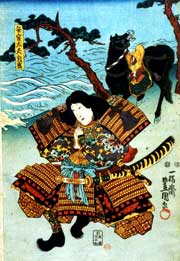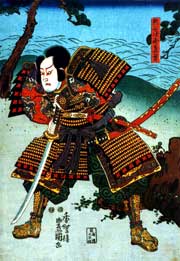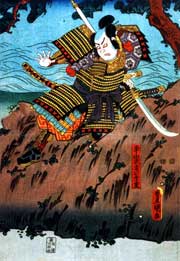| JINMON - KUMIUCHI |
| Play title | Ichi-no-Tani Futaba Gunki |
| Authors | Namiki S˘suke Asada Icch˘ Namioka Geiji Namiki Sh˘z˘ I Naniwa Sanz˘ Toyotake Jinroku |
| History |
The play "Ichi-no-Tani Futaba Gunki" (five acts) was originally written for the puppet theater and staged for the first time in ďsaka at the Toyotakeza in the 12th lunar month of 1751. It was adapted for Kabuki the following year and staged for the first time in Edo at the Moritaza in the 4th lunar month of 1752 [casting]. It was also performed for the first time in ďsaka in the 11th lunar month of 1752 at the Naka no Shibai as a kaomise drama [casting]. |
| Structure |
"Ichi-no-Tani Futaba Gunki" is made up of five acts. The "Jinmon", "Suma no Ura" and "Kumiuchi" scenes belong to the 2nd act. |
| Key words |
Genji Genpei Kassen Genpei-kassenmono Gidayű Ky˘gen Giri/Ninj˘ Heike Ichi-no-Tani Ichi-no-Tani no Tatakai Jidaimono Kumagai Naozane Migawarimono Suma no Ura Taira Atsumori |
| Summary |
Yoshitsune, under whom Kumagai and his son Kojir˘ are serving, has planned an attack on the Heike Camp. Kojir˘, although still but a youth, is in the van of the attack. It is night and inside the camp someone (in fact Atsumori) is playing a flute when Kojir˘ appears outside the walls. While the youth pauses, listening to the music, another Genji warrior, Hirayama, appears. Hirayama tells Kojir˘ that they must attack the camp together but when Kojir˘ rushes to the gate of the camp, shouting his name, as is customary, Hirayama hangs back and Kojir˘, unable to beat off single-handed the Heike warriors his challenge has aroused, is dragged into the enemy camp. Kumagai enters and Hirayama pretends that Kojir˘ was so reckless that he would not let himself be restrained by Hirayama and consequently has been captured. Kumagai immediately rushes forward to rescue his son but once again the cowardly Hirayama hangs back from the fighting. Kumagai reappears carrying his wounded son and tells Hirayama to fight off any pursuers so that he may get Kojir˘ back to their own camp. No sooner has Kumagai left than Atsumori appears and attacks Hirayama but the latter, true to form, runs away. Hirayama flees to the beach at Suma and hides among the rocks. Tamaori, who is seeking her husband, Atsumori, enters carrying a sword. Hirayama, who considers himself to be a suitor of Tamaori's, comes out of his hiding place and seizes the opportunity of this chance meeting to pretend that Tamaori must now go with him for her parents have agreed that they shall be married. Tamaori, however, declares that she is so deeply in love with Atsumori that she is ready to die with him if need be. Hirayama says that her devotion is useless, for he has killed Atsumori in battle. Tamaori draws her sword to revenge herself upon the lying Hirayama but is disarmed by him. Even under the threat of death she refuses to submit, so Hirayama in a rage mortally wounds her. The sounds of fighting are coming nearer and Hirayama hides the dying Tamaori among the rocks and runs away. Far out at sea appear the ships carrying the Heike force fleeing from Yoshitsune and his victorious army. Atsumori rides on his horse and plunges into the sea to make for the ships. Before he can go far, however, Kumagai appears and calls to Atsumori to turn and fight, which he does. Atsumori is thrown from his horse by Kumagai who himself dismounts to give the final blow. Before he does so he asks Atsumori if he has any last request. The youth proudly declares himself to be Atsumori, son of Tsunemori, and asks only that his body be returned to his father. Kumagai, taking pity on his young opponent, advises him to escape as no one else is around. Just at this moment Genji troops enter in pursuit of Heike stragglers and Hirayama, emboldened, comes out of hiding and, seeing Kumagai's hesitation, scornfully tells him that it is treachery to spare the life of an enemy. The proud youth begs Kumagai to kill him and with great reluctance Kumagai steels himself and severs Atsumori's head. Holding the head aloft, he proclaims to all the death of Atsumori at his hands. Tamaori hears his cry and in anguish crawls toward the body. Kumagai lets her touch the head. Her eyes, already blind with grief, close in death as she calls the name of her love. Kumagai's hesitation in killing Atsumori is explained by the fact that, having understood General Yoshitsune's message concerning the sacrifice of his son, Kojir˘, he had carried from the Heike camp not Kojir˘ but Atsumori and taken that youth to a place of safety. Kojir˘ had disguised himself in the distinctive armor of Atsumori and deliberately allowed himself to be killed so that his father's debt of honor to Atsumori's mother might be repaid. No hint of this is given in the scenes of "Jinmon" and "Kumiuchi" so that the dramatic shock will be all the greater when it is revealed later. In fact, the story is so well known to the audience that the dreadful conflict in the heart of Kumagai is fully understood and deeply felt from the very beginning. Source: Hironaga Shűzabur˘ |
 |
 |
 |
|
The actors Band˘ Shűka I, Ichimura Takenoj˘ V and Nakayama Bungor˘ II playing the roles of Taira no Atsumori, Kumagai Jir˘ Naozane and Hirayama no Mushadokoro in the "Kumiuchi" scene of the drama "Ichi-no-Tani Futaba Gunki", which was staged in the 6th lunar month of 1851 at the Ichimuraza (print made by Utagawa Toyokuni III) |
||
|
|
| Contact | Main | Top | Updates | Actors | Plays | Playwrights | Programs | Links | FAQ | Glossary | Chronology | Illustrations | Prints | Characters | Derivatives | Theaters | Coming soon | News |